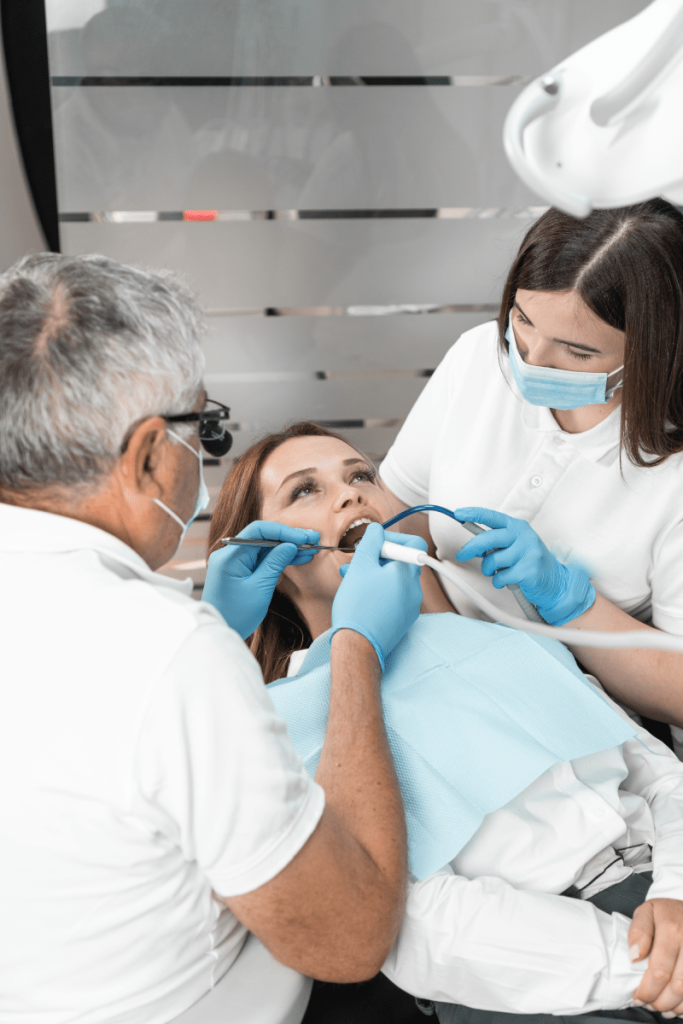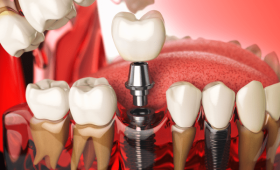What Are Dental Veneers?
Dental veneers are thin porcelain layers made from materials like porcelain or composite resin, which are bonded to the front surface of the teeth. These layers are used to improve the color, shape, size, and length of the teeth.
Veneers significantly enhance smile aesthetics while also being an ideal solution for closing small gaps, repairing cracks, or making crooked teeth appear straighter. Custom-designed by the dentist, veneers offer a translucency and shine similar to natural teeth, resulting in a highly natural appearance.
In Which Cases Are Dental Veneers Applied?
Dental veneers are ideal for solving various aesthetic and functional problems. The main areas of application are: to eliminate color changes and permanent stains on the teeth, to correct the appearance of slightly crooked teeth, to close gaps between teeth, to repair broken or cracked teeth, and to make small or irregularly shaped teeth more aesthetic. Veneers can also be used as an effective whitening method for teeth that have yellowed due to aging or genetic factors.
Are Dental Veneers a Permanent Solution?
Yes, dental veneers are a permanent solution but their lifespan depends on the patient’s oral hygiene and care. Porcelain veneers generally can last for 10 to 15 years, while composite veneers can last for 5 to 7 years. To extend the life of the veneers, regular and proper oral care, dental check-ups, and avoiding habits like biting hard foods are important. Veneers can wear down, crack, or change color over time, in which case they need to be renewed.
Is Dental Veneer Application Painful?
No, dental veneer application is generally a painless procedure. During the procedure, your dentist may perform a very small amount of grinding on the front surface of your teeth, which does not cause any pain. Most patients do not need anesthesia even during this grinding. However, if the patient shows sensitivity or if the procedure will be more extensive, local anesthesia can be applied. Pain or discomfort is also rarely seen after the procedure.
How Long Does It Take to Apply Dental Veneers?
The dental veneer process varies depending on the material used and the planned treatment. Porcelain veneers usually require two or three visits. In the first visit, the teeth are prepared and impressions are taken. In the second visit, the veneers prepared in the laboratory are bonded to the teeth. Composite veneers, on the other hand, can generally be completed in a single visit because the dentist shapes and hardens the veneer material directly on the tooth.

Are Teeth Ground Down for Dental Veneer Application?
Yes, for porcelain veneer application, a very thin amount of grinding is done on the front surface of the teeth. This grinding is done to ensure that the veneer fits naturally and smoothly on the tooth and to prevent the veneer from looking bulky. The amount ground down is equal to the thickness of the veneer (usually 0.5 to 1.0 mm). For composite veneers, the amount of grinding may be less or no grinding may be done at all.
Who Cannot Have Dental Veneers?
Dental veneers are generally not applied to people who have teeth grinding (bruxism), severe tooth decay, advanced gum disease, or who do not have enough tooth enamel. While teeth grinding can damage veneers, gum disease prevents the surface where the veneers will be bonded from being healthy. In such cases, the underlying health problems must first be treated.
What is the Lifespan of Dental Veneers?
The lifespan of dental veneers depends on the material used and the patient’s care. Porcelain veneers can generally last between 10 to 15 years because they are more durable and more resistant to staining. Composite veneers, on the other hand, are more sensitive and may need to be replaced after 5 to 7 years. Regular dental check-ups and proper care extend the life of the veneers.
Do Dental Veneers Look Natural?
Yes, when the right technique and materials are used, dental veneers look extremely natural. Porcelain veneers have a structure that reflects light just like natural teeth. In addition, your dentist and the laboratory customize the veneers to match the color, shape, and size of your other teeth. Thus, it is very difficult to distinguish the veneers from the other teeth.
Do Veneers Prevent Tooth Decay?
Since dental veneers cover the front surface of the tooth, they can prevent the formation of new decay on this surface. However, the risk of decay continues at the edges of the veneer or on the back surfaces where the veneer is not applied. Therefore, continuing with regular oral hygiene is very important for the health of the veneered teeth.
What Factors Affect the Price of Dental Veneers?
The price of dental veneers varies depending on the material used (porcelain or composite), the number of teeth to be treated, the dentist’s experience, and the location of the clinic. Porcelain veneers are more expensive than composite veneers because their production process is more complex. To get a definitive price, a consultation with your dentist and the creation of a personal treatment plan are necessary.
Is There Tooth Sensitivity After Veneers?
Temporary tooth sensitivity may occur after the veneer procedure. This sensitivity is usually to hot or cold foods and goes away on its own within a few days. This condition can occur due to the grinding of the tooth. If the sensitivity lasts for a long time or is severe, it is important to consult your dentist.
Do Dental Veneers Break Easily?
Although dental veneers are quite durable, they can break or crack when exposed to excessive force, just like natural teeth. To avoid shortening the life of the veneers, it is necessary to avoid biting hard foods (such as nuts), biting nails, or forcing teeth with hard objects. Patients with a teeth grinding problem are advised to use a night guard.
What is the Difference Between Dental Veneers and Teeth Whitening?
Teeth whitening is the process of lightening the color of the teeth with the help of special chemicals. This procedure is used to remove the yellowing or stains on natural teeth, but it does not change the shape or size of the tooth. Dental veneers, on the other hand, are a more comprehensive aesthetic solution that permanently changes the color, shape, size, and position of the tooth.
How Many Teeth Should Be Prepared for Dental Veneer Application?
The number of teeth to be prepared depends on the patient’s smile design goals. Generally, to get the best result, veneers are applied to all upper front teeth that are visible in the smile line (usually 6 to 8 teeth). In patients with a wider smile, this number can be even higher. In some cases, it is also possible to apply veneers to just a few teeth.
Can Dental Veneers Be Removed?
No, dental veneers cannot be removed because they are permanently bonded to the teeth. If a veneer is damaged or needs to be replaced, the dentist carefully removes the veneer with special tools and prepares a new one. This process is a procedure that must be done while preserving the underlying tooth.

What is the Difference Between Composite and Porcelain Veneers?
Composite veneers are a more affordable and easily repairable option that can be applied in a single session. However, they can stain more easily and are less durable than porcelain veneers. Porcelain veneers, on the other hand, are more durable, more resistant to staining, and offer an aesthetic that is much more similar to natural teeth. Porcelain veneers are generally more long-lasting and more costly.
How Are Veneered Teeth Cleaned?
Veneered teeth should be cleaned regularly just like natural teeth. It is important to brush your teeth at least twice a day, use dental floss and mouthwash. Although the surface of the veneers is resistant to staining, plaque can accumulate at the bonded edges. Regular dental check-ups are also vital for the preservation of veneers and oral health.
Do Veneered Teeth Turn Yellow?
Porcelain veneers are highly resistant to staining and do not easily turn yellow even with staining foods like coffee, tea, and red wine. However, composite veneers are more prone to staining and yellowing over time. Therefore, it is recommended that people who have composite veneers limit staining foods and perform regular care.
Do Dental Veneers Cause Bad Odor?
When applied correctly, dental veneers do not cause bad odor in the mouth. Bad odor is usually caused by food residues and bacterial plaque that accumulate under or at the edges of the veneers. This can occur when the veneer does not fit the tooth completely or when oral hygiene is insufficient. This risk can be eliminated with good oral hygiene.
What is the Difference Between Laminate Veneers and Zirconium Veneers?
A Laminate veneer (porcelain veneer) is the process of bonding a very thin porcelain layer to the front surface of the tooth. It covers only the front surface of the tooth and very little grinding is done on the tooth. Zirconium veneer, on the other hand, is a type of crown that covers the entire tooth and is made from a very durable material called zirconium. Laminate is used more for aesthetic purposes, while zirconium can be preferred for both aesthetic and functional purposes and requires more tooth grinding.
Do Dental Veneers Eliminate Bad Breath?
Since dental veneers do not directly treat the main causes of bad breath (tooth decay, gum disease, etc.), they do not directly eliminate bad breath. However, the gaps and irregular surfaces that are corrected with veneers can improve oral hygiene by reducing food accumulation. People who have a bad breath problem should first consult a dentist to determine the source of the problem.
How Many Sessions Are Required for Porcelain Veneers?
Usually two or three sessions are sufficient for porcelain veneers. In the first session, the teeth are prepared, impressions are taken, and temporary veneers are placed. This process takes about 1-2 hours. In the second session, the permanent porcelain veneers prepared in the laboratory are bonded to the teeth with a special adhesive. This session also takes about 1-2 hours.
How Long Does It Take for My Teeth to Get Used to the Veneers?
It is normal for patients to go through an adjustment period after dental veneers are placed. This process generally lasts between a few days and a week. During this time, some patients may feel a slight difference in speaking or chewing. However, this feeling passes in a short time, and the veneers feel completely natural.
Does Dental Veneer Application Affect My Oral Health?
When applied correctly and under hygienic conditions, dental veneers do not harm oral health. In fact, they can improve oral health by repairing broken or cracked teeth and closing gaps. However, regular oral care is very important to prevent problems such as decay or gum disease under the veneers.
Are Laminate Veneers and Porcelain Veneers the Same Thing?
Although these terms are often used interchangeably, “laminate veneer” refers more to the thin layer made of porcelain material that covers only the front surface of the tooth. “Porcelain veneer”, on the other hand, is a more general term that can include both laminates and porcelain crowns that cover the entire tooth. Therefore, technically, a laminate veneer is a type of porcelain veneer.
What Should Be Done to Extend the Life of the Dental Veneer?
Regular and proper oral care is very important to extend the life of veneers. You should brush your teeth twice a day, use dental floss, limit smoking and alcohol consumption, avoid staining foods, and avoid biting hard foods. Also, it is recommended that people who have habits like teeth grinding use a protective night guard.
Can Dental Veneer Treatment Be Reversed?
Dental veneer treatment cannot be reversed because the teeth are ground down. It is not possible to replace the ground-down tooth enamel. Therefore, before deciding to get veneers, it is very important to have a detailed consultation with a dentist and to clarify all expectations.
Do Dental Veneers Prevent Bad Habits?
Dental veneers do not prevent habits like nail-biting or biting on pens, and these habits can even damage the veneers. It is recommended that people with such habits first give them up and then consult a dentist. Such habits can cause the veneers to break or crack.
What Are the Opportunities and Risks of Dental Veneers?
Dental veneers offer many opportunities, such as significantly improving smile aesthetics and correcting the color and shape of the teeth. However, there are also risks. The most important risks include tooth sensitivity, the veneer breaking or falling off, and decay forming under the tooth. These risks can be minimized with the right dentist choice and regular care.
Factors Affecting Price in Veneers
In coatings, the factors that play a role in changing the price are the number of coatings and the type of material used. For example, a single porcelain veneer costs £70. It is very important from which material the coating is made. The materials are selected by your doctor, with the options that he deems most suitable for you, and with your preference. For a more natural appearance or stronger teeth, the material of the coating is important.
Veneers Prices in Turkey
| Dental Veneers | Dental Veneers Prices In Pound |
| E- max Veneers | £ 125 |
| Porcelain Veners | £ 70 |
| Laminate veneers | £ 185 |
| Composite Bonding | £110 |
Why are Veneers Cheap in Turkey?
The cost of living in Turkey is quite low. The exchange rate is also very high. For this reason, the money of tourists coming to the country is very valuable. Thus, treatments for Incoming Tourists correspond to a very affordable price. At the same time, not only treatments, but also needs such as accommodation, transportation and nutrition are met at a very affordable price. This makes it attractive for tourists to take a vacation while receiving treatment. Thus, the patients who come both take a vacation and receive treatment.
Does Being Cheap Mean It Is Poor Quality?
No. Treatments in Turkey are of the highest quality. The success of health tourism in Turkey is quite high. This causes many tourists to prefer Turkey for treatment. Clinics in Turkey work extremely hygienically. At the same time, doctors are experienced and highly successful people in their field. This increases the success rate of treatments. You can avoid spending a small fortune by having the treatment in Turkey at the standards you can get in England.
Why Cure Holiday?
**Best price guarantee. We always guarantee to give you the best price.
**You will never encounter hidden payments. (Never hidden cost)
**Free Transfers (Airport – Hotel – Airport)
**Our Packages prices including accommodation.



